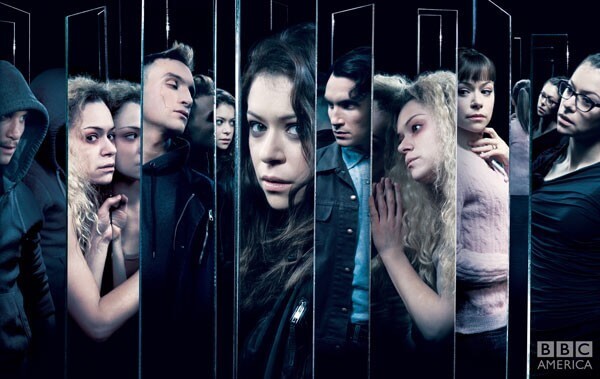After decades of seeing women portrayed as one-denominational or secondhand characters, from practically interchangeable “Bond” girls to stereotypical soccer moms blissfully juggling home and work priorities, Orphan Black is a breath of fresh air. The series, airing on Space in Canada and BBC America in the United States, takes on the ethics of cloning while presenting dynamic facets of the female personality through five clones (all played by the talented Canadian actress Tatiana Maslany) with distinct characteristics and very different lives. While the feminism in Orphan Black is worthy of praise, it’s countered by a lack of dimension in the male characters on the show that could be either the one flaw in an otherwise groundbreaking series – or a well-deserved intentional juxtaposition of roles.
Possibly alluding to the once-common stereotype that all female characters have basically the same set of qualities, the five clones in Orphan Black come from the same source and yet they’re all entirely different with compelling stories to tell. In addition to tackling cloning and the complexities of the female mindset, the series also offers a take on the nature vs nurture concept by showing that five individuals identically created can each be influenced in different ways by their surroundings. It’s this very fact that allows Orphan Black to fully explore how those influences affected each woman, which is certainly a departure from how women are often portrayed on television.
While it’s easy to use female characters from TV’s past as prime examples of how women have been typecast in certain roles, there are more recent examples that just as effectively illustrate this point. For instance, The Big Bang Theory’s portrayal of women in science are often seen as stereotypical, wearing frumpy unfashionable clothes and showcasing a cold demeanor. And when the women in this show do break this stereotype, the men still question their credibility. The popular zombie apocalyptic television show The Walking Dead also seems to show many signs of blatant misogyny. Andrea’s decisions were all based around men and Maggie devolved into a meek and one dimensional character. Even an actress as diverse as Melissa McCarthy tends to get cast as the same audacious, over-the-top character in most of her film and TV roles.
The ability of Maslany to play so many different characters while retaining her credibility in doing so has been praised by both critics and fans alike. It’s a diversity that’s seen as positive, especially by members of the LGBTQA community, with two of the clones (Cosima and Felix) being openly gay and one – Tony Sawicki (who was born Antoinette Sawicki) – being transgender. The personalities of each clone are just as diverse, with characters including a now ex-alcoholic soccer mom, a brilliant scientist and graduate student, and a trained assassin with a tortured past.
For all that Orphan Black is doing right, there are interesting inadequacies that seemingly contradict the show’s purpose to present multidimensional characters. Perhaps not-so-coincidentally, it’s the male characters on the show that come off as rather one-note. It can be stated with a fair degree of certainty and accuracy that all the straight men on the show come off as weak, easily manipulated individuals whose motives and intentions are clearly detectable to even the casual viewer. Furthermore, each male character displays one – and only one – unique personality trait. Show creators Graeme Manson and John Fawcett aren’t making any apologies for that particular “criticism,” suggesting that it’s a device employed for the sole purpose of making a long-overdue point about female stereotypes.
It is the preceding qualities of this show that makes Orphan Black so praise-worthy in the feminist community. The third season has come to a close and the fourth is set to air sometime next year. Though it seems like quite a long time to wait, you can still experience the show by streaming it on Amazon Video or on demand with Comcast Xfinity or Direct TV. If this doesn’t seem satisfying for those die-hard Orphan Black fans, similar qualities seen in the show in terms of how women are portrayed can be seen in Netflix original Orange Is the New Black and in a few examples from TV’s recent past, including the mother-daughter team on Gilmore Girls and the kick-butt protagonist in Buffy the Vampire Slayer.
As for the obvious role-reversal in Orphan Black, it only emphasizes the diverse appeal of the five very different female characters who add to the realism of the series as the layers of their personalities are slowly revealed. While critics initially wrote off the show since, on the surface, it appeared to be the tale of a bunch of female clones discovering each other and fending off nefarious enemies looking to snuff them out, the show has proven to be more complex, entertaining, compelling and thought-provoking than originally anticipated – and a much-appreciated depiction of the many aspects of the female personality.
In Related News:
- Maria Doyle Kennedy and Jordan Garvaris Interview
- Evelyne Brochu, Dylan Bruce, and Kristian Bruun Interview
- Graeme Manson Interview
Follow Us On:







